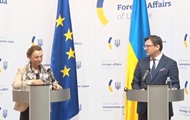(Keith Birmingham/The Orange County Register via AP)
–
CORONAVIRUS – No rush. Unlike the United States, where the vaccination of children aged 5 to 11 against the coronavirus began in early November, French scientists believe that it is currently not useful to apply the same strategy in France, where younger health problems are different.
On November 2, the American health authorities gave the green light to launch the vaccination campaign against Covid-19 among the youngest, with the Pfizer / BioNTech vaccine. In France, the vaccination strategy is conditional on the approval of the European Health Agency and then of the Haute Autorité de Santé. The European agency began to look into the subject in mid-October and the conclusions are not expected for “a few months”.
However, for Professor Alain Fischer, chairman of the Vaccine Strategy Steering Committee, there is no point in rushing. In an interview with franceinfo this Thursday, November 4, he estimated that the vaccination of children under 12 was not a priority given the profile of French children.
Less obesity and severe forms
In the United States “many more children are hospitalized for severe forms, linked to the fact that many children are obese there. It is therefore legitimate, in this context, that they begin the vaccination of young children ”, he explained. According to the WHO, obesity is indeed one of the factors capable of aggravating the coronavirus infection, and leading to hospitalization.
In France, “12% of children in large kindergarten were overweight and 3.5% were obese in 2013”, according to data from the Health Insurance. A figure that reaches 20% among 6-11 year olds in the United States, underlines the infectious disease specialist Benjamin Davido in the columns of L’Obs.
This American public health problem “led during the fourth wave to a sharp increase in the hospitalizations of adolescents and children, something that we have seen very little in Europe, where despite a rejuvenation of patients, there has been no only sporadic cases of hospitalizations of children ”, he adds.
In France and in Europe, “vaccinating the very young is much less useful” and according to him it is better to increase efforts on the 3rd dose for vulnerable people. An opinion shared by Alain Fischer for whom “In France, we can afford to wait a bit” to vaccinate children.
Less transmission of the virus in children
The government’s “mister vaccine”, however, encourages observation of the results in the United States, in particular on the circulation of the virus in children.
The data obtained so far, as the WHO points out, show that while children can be carriers, they transmit it much less than adolescents and adults. The vaccine, which reduces the risk of transmission, seems even less useful in people who are already spreading little.
Finally, there is also the question of the effectiveness of the vaccine over time. Current data has shown it to be limited, which is why the 3rd dose is now recommended. “It is unthinkable to ask parents to remind their children every ten months. We will have to wait until we have a more effective vaccine in the long term, ”said Benjamin Davido.
Other types of vaccines, however, may be more suitable for children. The infectious disease specialist mentions, for example, “intranasal vaccines”, similar to those against influenza, and “which block transmission by preventing the virus from attaching to the mucous membranes.”
See also on The HuffPost: Why France has ordered 50,000 doses of anti-Covid pills
–


